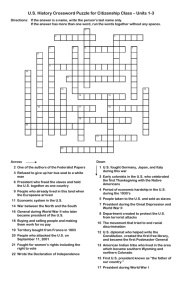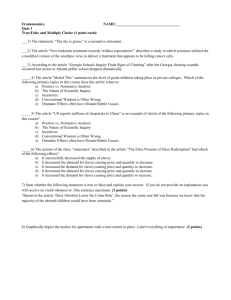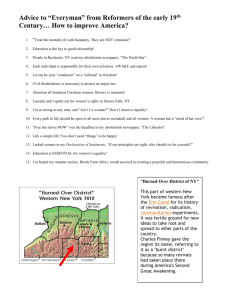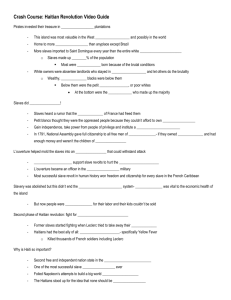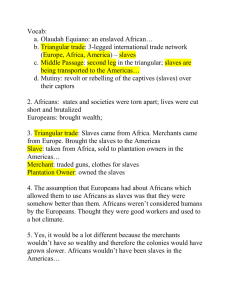File - your own free website
advertisement
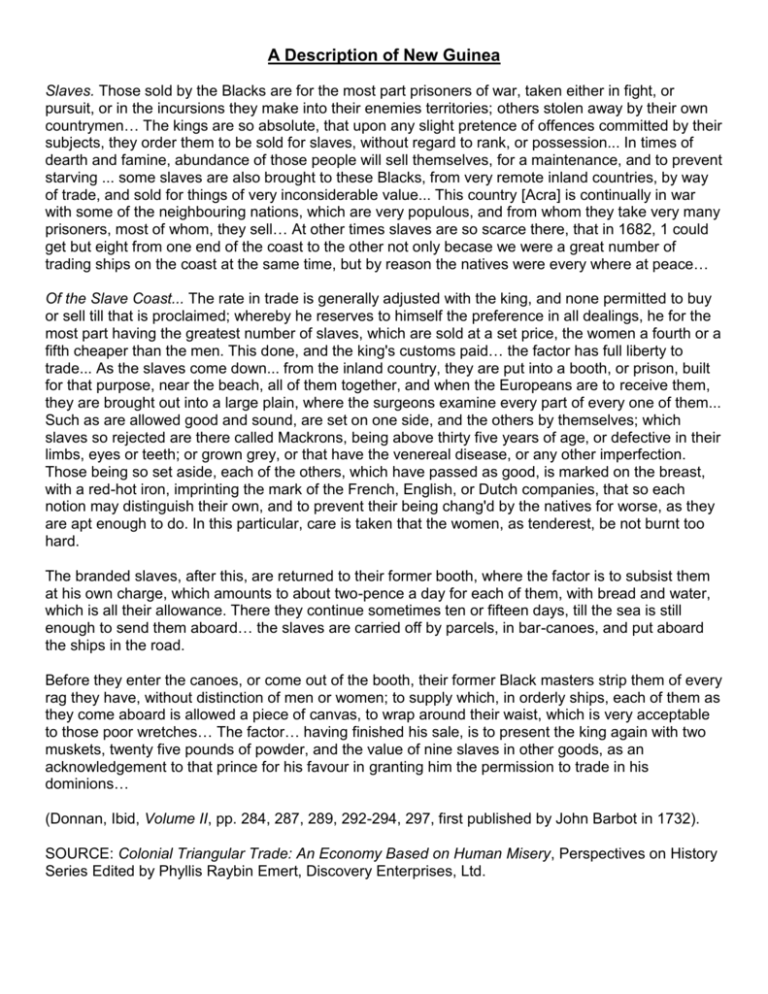
A Description of New Guinea Slaves. Those sold by the Blacks are for the most part prisoners of war, taken either in fight, or pursuit, or in the incursions they make into their enemies territories; others stolen away by their own countrymen… The kings are so absolute, that upon any slight pretence of offences committed by their subjects, they order them to be sold for slaves, without regard to rank, or possession... In times of dearth and famine, abundance of those people will sell themselves, for a maintenance, and to prevent starving ... some slaves are also brought to these Blacks, from very remote inland countries, by way of trade, and sold for things of very inconsiderable value... This country [Acra] is continually in war with some of the neighbouring nations, which are very populous, and from whom they take very many prisoners, most of whom, they sell… At other times slaves are so scarce there, that in 1682, 1 could get but eight from one end of the coast to the other not only becase we were a great number of trading ships on the coast at the same time, but by reason the natives were every where at peace… Of the Slave Coast... The rate in trade is generally adjusted with the king, and none permitted to buy or sell till that is proclaimed; whereby he reserves to himself the preference in all dealings, he for the most part having the greatest number of slaves, which are sold at a set price, the women a fourth or a fifth cheaper than the men. This done, and the king's customs paid… the factor has full liberty to trade... As the slaves come down... from the inland country, they are put into a booth, or prison, built for that purpose, near the beach, all of them together, and when the Europeans are to receive them, they are brought out into a large plain, where the surgeons examine every part of every one of them... Such as are allowed good and sound, are set on one side, and the others by themselves; which slaves so rejected are there called Mackrons, being above thirty five years of age, or defective in their limbs, eyes or teeth; or grown grey, or that have the venereal disease, or any other imperfection. Those being so set aside, each of the others, which have passed as good, is marked on the breast, with a red-hot iron, imprinting the mark of the French, English, or Dutch companies, that so each notion may distinguish their own, and to prevent their being chang'd by the natives for worse, as they are apt enough to do. In this particular, care is taken that the women, as tenderest, be not burnt too hard. The branded slaves, after this, are returned to their former booth, where the factor is to subsist them at his own charge, which amounts to about two-pence a day for each of them, with bread and water, which is all their allowance. There they continue sometimes ten or fifteen days, till the sea is still enough to send them aboard… the slaves are carried off by parcels, in bar-canoes, and put aboard the ships in the road. Before they enter the canoes, or come out of the booth, their former Black masters strip them of every rag they have, without distinction of men or women; to supply which, in orderly ships, each of them as they come aboard is allowed a piece of canvas, to wrap around their waist, which is very acceptable to those poor wretches… The factor… having finished his sale, is to present the king again with two muskets, twenty five pounds of powder, and the value of nine slaves in other goods, as an acknowledgement to that prince for his favour in granting him the permission to trade in his dominions… (Donnan, Ibid, Volume II, pp. 284, 287, 289, 292-294, 297, first published by John Barbot in 1732). SOURCE: Colonial Triangular Trade: An Economy Based on Human Misery, Perspectives on History Series Edited by Phyllis Raybin Emert, Discovery Enterprises, Ltd. A Letter from Thomas Hancock The Charming Lydia was a brig, or brigantine, a sailing ship owned by Thomas Hancock of Boston. A prominent merchant, Hancock controlled a fleet of cargo ships. He supplied the Newfoundland fishing fleet with rum and molasses and exported codfish, whale oil, potash, and lumber. He was the uncle of John Hancock, who later became a leader of the American Revolution in Massachusetts. In the following letter, Thomas Hancock instructs Simon Gross, the ship's captain, as to the best procedure for disposing of his cargo... Boston, Dec. 20, 1743 Captain Simon Gross, You have command of the Charming Lydia brigantine, in all respects fit for the sea. Take the first wind and weather for sailing and proceed to the West Indies. You have liberty to go to any of the English islands and, if you think it safe, to any of the French islands. But I advise you to go directly to St. Eustatius [a small island east of Puerto Rico] and confer with Mr. Godet, after which you will be able to form a better judgment about where to make a voyage. After delivering your cargo, pick up a load of molasses, shipping any excess on the best terms you can get or bring it in indigo. Your share will be one-eighth of the cargo now loaded aboard and oneeighth of the proceeds from the sale of the cargo you obtain. Make all possible dispatch so that you arrive early for landing. Make sure that your casks are good and well stowed. Bring some fruit for the officers if there is any to be had. Be prudent and saving of expenses. If you can get good freight for Holland or England you may take it, or if you have the opportunity to sell the ship and its cargo, you have my consent. You have the freedom in every respect to act as you think best for my interest. But if you plan to return here, a load of molasses would be the best cargo to bring. Write me at every opportunity. May the Good Lord protect you and our interests from all dangers and enemies and help you to act for the best in all things. I wish you a good voyage and am your owner. A Slave Trade Journal An Account of the Slave Trade Dr. Alexander Falconbridge Some wet and blowing weather having occasioned the portholes to be shut, and the grating to be covered, fluxes and fevers among the negroes ensued. While they were in this situation, my profession requiring it, I frequently went down among them, till at length their apartments became so extremely hot as to be only sufferable for a very short time. But the excessive heat was not the only thing that rendered their situation intolerable. The deck, that is the floor of their rooms, was so covered with the blood and mucous which had proceeded from them in consequence of the flux, that it resembled a slaughter-house. It is not in the power of the human imagination to picture to itself a situation more dreadful or disgusting. Numbers of the slaves having fainted, they were carried up on deck, where several of them died and the rest were, with great difficulty, restored... (first published in London, 1788, from Pope-Hennessy, Ibid, P. 102) SOURCE: Colonial Triangular Trade: An Economy Based on Human Misery, Perspectives on History Series Edited by Phyllis Raybin Emert, Discovery Enterprises, Ltd. A Slave’s Accounting When I was carried on board I was immediately handled and tossed up, to see if I were sound, by some of the crew. I was now persuaded that I had got into a world of bad spirits, and that they were going to kill me. I was not long allowed to indulge my grief. I was soon put down under the decks. There, with the stench and crying together, I became so sick and so low that I was not able to eat, not had I the least desire to taste anything. But soon, to my grief, two of the white men offered me something to eat. On my refusing to eat, one of them held me fast by the hands and tied my feet, while the other flogged me severely. I feared I should be put to death because the white people looked and acted, as I thought, in so savage a manner. I had never seen among any people such instances of brutal cruelty. And this was not only shown towards us blacks, but also to some of the white themselves. One white man in particular I saw flogged so unmercifully with a large rope that he died because of it; and they tossed him over the side as they would have done a brute. This made me fear these people the more. The stench of the hold while we were on the coast was so intolerably loathsome that it was dangerous to remain there for any time. The closeness of the place and the heat of the climate, added to the number in the ship, which was so crowded that each had scarcely room to turn himself, almost suffocated us. One day, when we had a smoother sea and moderate wind, two of my wearied countrymen, who were chained together preferring death to such a life of misery, somehow made through the netting and jumped into the sea. Immediately another quite dejected fellow, who on account of his illness was allowed to be out of irons, also followed their example. And I believe many more would very soon have done the same if they had not been stopped by the ship's crew, who were instantly alarmed. There was such a noise and confusion among the people of the shop to stop and get the boat to go after the slaves. Two of the wretches were drowned, but they got the other, and afterwards flogged him unmercifully for preferring death to slavery. SOURCE: Adapted from Gustavus Vasa, "The Interesting Narrative of the Life of Olandah Equiano or Gustavus Vasa, Written by Himself," 1793. Voices of Freedom: Sources in American History, Prentice Hall, pp. 48-49. An Act for Extending and Improving the Trade to Africa, 1750 Whereas the Trade to and from Africa is very advantageous to Great Britain, and necessary for the supplying the Plantations and Colonies thereunto belonging with a sufficient Number of Negroes at reasonable Rates; and for that Purpose the said Trade ought to be free and open to all his Majesty's Subjects: Therefore be it enacted, and it is hereby enacted by the King’s most Excellent Majesty, by and with the Advice and Consent of the Lords Spiritual and Temporal, and Commons, in this present Parliament assembled, and by the Authority of the same. That it shall and may be lawful for all his Majesty's Subjects to trade and traffick to and from any Port or Place in Africa, between the Port of Sallee in South Barbary, and the Cape of Good Hope, when, and at such Times, and in such Manner, and in or with such Quantity of Goods, Wares or Merchandizes, as he or they shall think fit, without any Restraint whatsoever. (Donnan, Ibid, Volume 1, p. 473). SOURCE: Colonial Triangular Trade: An Economy Based on Human Misery, Perspectives on History Series Edited by Phyllis Raybin Emert, Discovery Enterprises, Ltd. Letter from Wilkinson and D’Ayrault to Captain David Lindsay Newport [Rhode Island] June 19th 1754 S'r, you being Master of our Schooner Siralone and ready to sail, our orders are that you Imbrace the first oppertunity of wind and weather and Proceed for the Coast of Africa, when plese God you arrive there Dispose of your cargoe on the best terms you Can for Gold, Good Slaves etc when you have finished your trade on the Coast (wch we desire may be with all Convenient Dispatch) Proceed for the Island of Barbadoes where you will find Letters Lodged for you in the hands of Mr. Elias Merivelle with whom Consult in regard to the Sale of your Slaves and if they will fetch Twenty Six pounds Sterling p head round you may dispose of them there and Invest the Produce as pr your orders you will find Lodged there, but If you cannot sell at the above price, Proceed without Loss of time to St. Vincents there dispose of your Slaves. If they will fetch five hundred Livres round in Money, and In case you sell there you may purchase as much Cocoa as you can Carry Under your halfe Deck and proceed to St. Eustatia their Load with Molasses and If any opportunity of Fraight ship the remainder of the nett proceeds in Molasses to this Port or to Boston If to Boston Consign it to Messrs Steyh[?] and Wm. Greenleafe. Should you find it will detain you long at St. Eustatia to accomplish this send the Schooner home as soone as Possible after She is Loaded and Come Passinger after you have finished your business but If they will not fetch the above Price Proceed directly for the Island of Jamaica, there you will find orders Lodged for you and dispose of your Slaves on the best terms you can and Invest amount of (From Elizabeth Donnan, Documents Illustrative of the History of the Slave Trade to America -Volume III – New England and the Middle Colonies. New York: Octagon Books, Inc., 1965, pp. 148-149, originally published in 1932). SOURCE: Colonial Triangular Trade: An Economy Based on Human Misery, Perspectives on History Series Edited by Phyllis Raybin Emert, Discovery Enterprises, Ltd. On Board a Slave Ship – Journal of Richard Drake, 1788 I am growing sicker every day of this business of buying and selling human beings for beasts of burden… On the eighth day [out at sea] I took my round of the half deck, holding a camphor bag in my teeth; for the stench was hideous. The sick and dying were chained together. I saw pregnant women give birth to babies whilst chained to corpses, which our drunken overseers had not removed. The blacks were literally jammed between decks as if in a coffin, and a coffin that dreadful hold became to nearly one half of our cargo before we reached Bahia. (Pope-Hennessy, Ibid, p. 4). SOURCE: Colonial Triangular Trade: An Economy Based on Human Misery, Perspectives on History Series Edited by Phyllis Raybin Emert, Discovery Enterprises, Ltd. Traders by Day; Robbers by Night ... I had two opportunities of seeing how slaves were procured in the River of Old Calabar. I resided with the king of New Town for four months, and he allowed me to go up the river with him to trade for slaves. I went with him twice within that time. In the first expedition, there was a fleet consisting of from ten to twelve canoes, which were properly manned and armed. With this fleet we set out to trade. In the day time we called at the villages as we passed, and purchased our slaves fairly; but in the night we made several excursions on the banks of the river. The canoes were usually left with an armed force: the rest, when landed, broke into the villages, and, rushing into the huts of the inhabitants, seized men, women, and children... We obtained about fifty negroes in this manner, in our first expedition. In our second, the same practices were in force; for we traded fairly by day, and became robbers in the night... (The testimony of witnesses as reported by Thomas Clarkson, from Donnan, Ibid, Volume II, p. 572). SOURCE: Colonial Triangular Trade: An Economy Based on Human Misery, Perspectives on History Series Edited by Phyllis Raybin Emert, Discovery Enterprises, Ltd.
